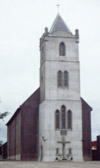General
| Texas Connection
| Glascarrig
History - General
Pre-historic
Farming is thought to have reached Co. Wexford, sometime around 2,500 B.C. and you
can see the burial places of this era in the Dolmens dotted around the county.
Stone and flint were used to create farming tools, and other implements.
Flint pebbles can be seen all along the coastline here.
A flint javelin head found at Glascarrig can be seen in Enniscorthy Museum.
There is plenty of evidence of the presence of Bronze age
inhabitants in the area, including two flat axeheads found
at Cahore which are in the National Museum in Dublin.
Around 300 B.C. there was a general movement westwards of the Celtic
tribes from Central Europe, and their arrival in Ireland brought the
Iron Age here. The people lived in Ring Forts (Raths).
Christianity
The arrival of St. Patrick in the 5th century A.D. coincided with a huge increase in conversions to Christianity.
Legend has it that he built a Church at Donaghmore (Dómhnach Mór- translated “great church”). It is mentioned in a
fragment of “The Book of Armagh”, which was written circa 800A.D. The ruins of an old Protestant Church (last used
around 1840) still stand on the site, next to the ancient graveyard of Donaghmore. Many of the old headstones in the
cemetery, are so old their markings have disappeared completely.
 The high tower Catholic Church in Ballygarrett dates from 1838; the previous Church having been burnt.
The seats in the Church are made of teak from the wreck of “The Irrawaddy”, a ship that sank off Cahore,
around 1856. The Church yard is home to two fine memorials; one in memory of the people who perished during
The Great Famine, and the other celebrating “The Texas Connection”, (click the link at the top of the page for more).
The Church yard was also the site of the old parish hall, up until the 1960’s. The old school (built 1915) now serves
as the parish hall, and is situated in the middle of Ballygarrett village. The new school (St. Mary’s N.S.) was
built in 1970, just a short walk outside of the village.
The high tower Catholic Church in Ballygarrett dates from 1838; the previous Church having been burnt.
The seats in the Church are made of teak from the wreck of “The Irrawaddy”, a ship that sank off Cahore,
around 1856. The Church yard is home to two fine memorials; one in memory of the people who perished during
The Great Famine, and the other celebrating “The Texas Connection”, (click the link at the top of the page for more).
The Church yard was also the site of the old parish hall, up until the 1960’s. The old school (built 1915) now serves
as the parish hall, and is situated in the middle of Ballygarrett village. The new school (St. Mary’s N.S.) was
built in 1970, just a short walk outside of the village.
 The high tower Catholic Church in Ballygarrett dates from 1838; the previous Church having been burnt.
The seats in the Church are made of teak from the wreck of “The Irrawaddy”, a ship that sank off Cahore,
around 1856. The Church yard is home to two fine memorials; one in memory of the people who perished during
The Great Famine, and the other celebrating “The Texas Connection”, (click the link at the top of the page for more).
The Church yard was also the site of the old parish hall, up until the 1960’s. The old school (built 1915) now serves
as the parish hall, and is situated in the middle of Ballygarrett village. The new school (St. Mary’s N.S.) was
built in 1970, just a short walk outside of the village.
The high tower Catholic Church in Ballygarrett dates from 1838; the previous Church having been burnt.
The seats in the Church are made of teak from the wreck of “The Irrawaddy”, a ship that sank off Cahore,
around 1856. The Church yard is home to two fine memorials; one in memory of the people who perished during
The Great Famine, and the other celebrating “The Texas Connection”, (click the link at the top of the page for more).
The Church yard was also the site of the old parish hall, up until the 1960’s. The old school (built 1915) now serves
as the parish hall, and is situated in the middle of Ballygarrett village. The new school (St. Mary’s N.S.) was
built in 1970, just a short walk outside of the village.